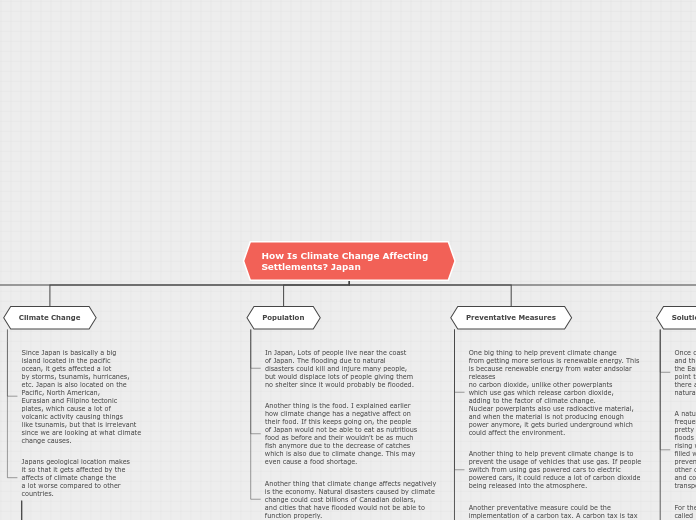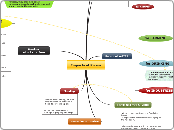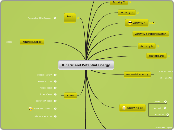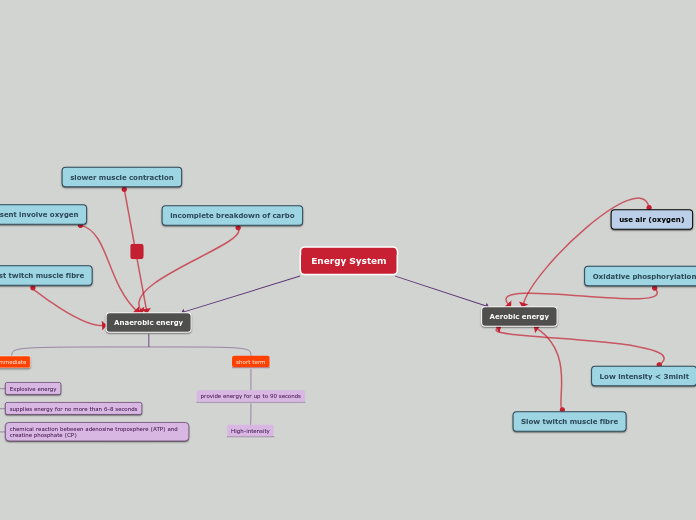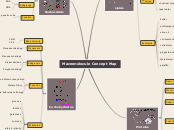How Is Climate Change Affecting Settlements? Japan
Solutions in case this happens
For rising sea levels, some companies are thinking about ways to try and get to re-freeze polar ice,
and if there is more polar ice, climate change will decrease, as well as the global sea levels.
For the erosion of beaches and coastlines, something
called beach reclamation could be performed to the
eroded beaches/coastlines. Beach reclamation is the
process of restoring beaches that have eroded a lot
Sand is added to the eroded beach which then replenished the beach.
A natural disaster that happens in Japan pretty
frequently is flooding. Flooding in Japan is
pretty frequent occurrence. One way to help
floods once they happen due to storms, and
rising waters, could be to use inflatable barriers
filled with water to try and fence off the water, to
prevent the movement of the water to move to
other cities and ground. After the water is secured
and contained in an area, the water can then be transported to try and get rid of all the flooding.
Once climate change happens, it happens
and there is no reverting it. At that point
the Earth will probably be doomed at that
point there is probably no reverting. However,
there are solutions to help in case some
natural disasters in case they happen.
Preventative Measures
I couldn't find any ways to prevent the other things
like erosion but most of these disasters are caused by climate change, so if we can prevent the the increase of climate change, most of these disasters
could be prevented.
For flooding caused by climate change, natural
flood management could be used to channel the
water from floods to other place, reducing the
damage caused by floods, as well as the deaths,
injuries, and money used for cleaning up.
Another preventative measure could be the implementation of a carbon tax. A carbon tax is tax
that you would have to pay for the amount of carbon
dioxide you produce. This could be gas from your car, or home appliances. This would have a greater impact on large companies and factories though since that is where most of the carbon dioxide emissions come from. Although this wont necessarily
stop the usage of gas and other things like that, it
discourages the usages of carbon dioxide as companies don't want to pay the test.
Another thing to help prevent climate change is to
prevent the usage of vehicles that use gas. If people
switch from using gas powered cars to electric powered cars, it could reduce a lot of carbon dioxide
being released into the atmosphere.
One big thing to help prevent climate change
from getting more serious is renewable energy. This is because renewable energy from water andsolar releases
no carbon dioxide, unlike other powerplants
which use gas which release carbon dioxide,
adding to the factor of climate change.
Nuclear powerplants also use radioactive material, and when the material is not producing enough power anymore, it gets buried underground which
could affect the environment.
Population
Another thing that climate change affects negatively
is the economy. Natural disasters caused by climate
change could cost billions of Canadian dollars,
and cities that have flooded would not be able to
function properly.
This is important to know because Japan mainly
gets most of its money through agriculture, and
tourism. But the problem is, how would t hey
continue to profit in agriculture when the quality
of the grain slowly gets worse and worse? How
would they be able to make a profit when they
wont be able to catch as many fish? And how
would they profit in tourism if some cities
were down due to flooding?
Due to all the money in damages climate change
causes as well as the reduction of money, this
means that the population of Japan and Japan
in general would get affected in a bad way.
Japan would need to find new ways to make money
if climate change continues, and Japanese people
working in those industries will need to find new jobs in the near future since those jobs wont be profitable anymore.
Another thing is the food. I explained earlier
how climate change has a negative affect on
their food. If this keeps going on, the people
of Japan would not be able to eat as nutritious
food as before and their wouldn't be as much
fish anymore due to the decrease of catches
which is also due to climate change. This may
even cause a food shortage.
In Japan, Lots of people live near the coast
of Japan. The flooding due to natural
disasters could kill and injure many people,
but would displace lots of people giving them
no shelter since it would probably be flooded.
Climate Change
Japans geological location makes
it so that it gets affected by the
affects of climate change the
a lot worse compared to other
countries.
Erosion is also another problem that climate change
causes, and one that Japan's coasts are affected by.
Erosion is when materials of the Earth as worn
away, then transported by natural forces like the
wind or water.
Climate change causes the seal level to rise.
When the sea levels rise, the water could flood
coastline/beaches, which then erodes it,
taking the material back into the ocean.
Japan is already recovering from erosion
because of the second world war, but this
erosion is caused by climate change and is now
slowly eroding Japans beaches and coastlines
away.
Extreme storms could show up more and be more intense than before due to climate change.
In a country like Japan, where it is surrounded by
water, and lots of its population lives near the
coast, extreme storms could have devastating
affects. It could cause lots of money in damages
and could even take human life. These storms also
cause flooding and other issues which would not
help the case.
Climate change is making more and more extreme
storms, and the higher temperature the Earth is,
the more severe and intense these storms will be.
An additional thing that could happen due to climate
change is the weather.
Climate change increase the chance of having
more more natural disasters such as storms
and floods, as well as increasing the the
intensity of these disasters.
Climate change also affects the weather patterns.
In general, the weather would be hotter. The
snow that comes in winter would be decreased
as well as the rain/precipitation which
could affect the agriculture in Japan even more.
Another thing that climate change causes
is the production of food.
Another food affected by climate change is fish.
Fish in Japan is another very popular food in
the country of Japan. Since Japan an island
in the middle of an ocean, its waters are very
rich in fish, and its waters could even be
considered as some of the richest fisheries in
the world. Although Japan has waters rich
in fish, it could have a large decline in fish
catches in the near future if climate change
continues.
The reason Japan may decline in fish
catches in the near future is due to
climate change, but how? This is because
rapid rises in temperatures and
acidification could lead to the destruction of
fish species and marine life in general.
The warming waters are changing the
ecosystem of how fish stocks are distributed.
93 percent of heat in the Earth's atmosphere
is also absorbed by the oceans, making it
get pretty warm.
The higher temperatures cause by climate
change, is making it harder for Japanese
farmers to produce grain. The high
temperatures mixed in with the higher
concentration of carbon dioxide in our
atmosphere decreases the quality of the
grain, and makes it more fragile, and
less nutritious, and continues to be
more and more with higher temperatures
and concentration of carbon dioxide.
Lots of Asian countries such as Japan,
consume a lot of grain. Grain such as
rice, is very important to Japan as it
it a very popular food. Its national dish
is even curry with rice. On average,
A Japanese person consumes around
50 kilos of rice per year, and Japan
has a population of about 126 people,
so that is a lot of grain. With this many
people in Japan and a constant demand
for rice (grain), you can see how this can
be problem when the quality of the
grain slowly degrades over time due to
climate change.
One thing climate change causes
is rising sea levels. Since Japan
is literally just a big island in the
ocean, rising sea levels could
cause Japan to loose land and
loosing land means that people
who live near the shore are at
risk of their houses/shelters
flooding due to the rising sea
levels.
The reason why global warming could
make water levels rise, is because
us humans, produce a lot of carbon
dioxide into the atmosphere. As you
probably know, carbon dioxide is a
greenhouse gas. Greenhouse gasses
are really good at absorbing heat
emitted from the sun. When we have
a lot of carbon dioxide in our Earth's
atmosphere, it is able to trap a lot of
heat, and therefore make Earth's
temperature higher. This then causes
the polar ice to melt, and therefore
increase the the water levels,
as well as increase the heat even more,
since the polar ice helps reflect some
of the heat rays from the sun out of the
Earth and into space.
In Japan, just 1 metre of rising sea
levels could put about 4.1 million
people at risk of flooding, and could
also cover over 2,400 square
kilometres of land in major cities.
This could happen in the future
if we continue to disregard global
warming.
Since Japan is basically a big
island located in the pacific
ocean, it gets affected a lot
by storms, tsunamis, hurricanes,
etc. Japan is also located on the
Pacific, North American,
Eurasian and Filipino tectonic
plates, which cause a lot of
volcanic activity causing things
like tsunamis, but that is irrelevant
since we are looking at what climate
change causes.
Location
Japan is a country located on an island
along the east coast of the continent
Asia. The closest land to Japan would
be South and North Korea, as well as
a little bit of Russia. The island of
Japan is located on the western North
Pacific Ocean, however, the area
between South and North Korea,
as well as a little bit of Russia, is called
the Sea of Japan.
The country of Japan is comprised
of 4 main islands to make 1 big
island, which is Japan. The 4
islands from North to South are
the following: Hokkaido, Honshu,
Shikoku, and Kyushu island.
There are also
I will be researching about Japan
for this project.
